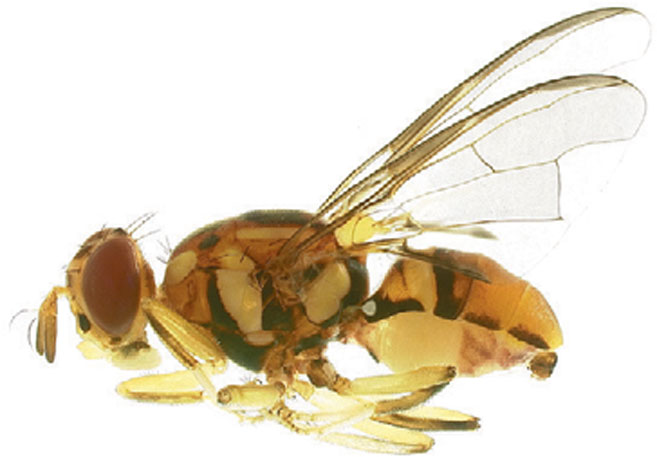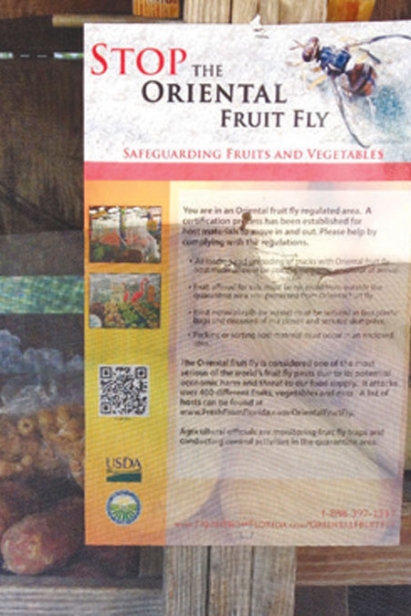Oriental Fruit Fly: Serious Business for Growers
Sometime before dawn on Sept. 2, a quarantine went into effect in a 85-square-mile area in the heart of the Redland, home to packing houses, fruit groves, vegetable fields, fruit stands, plant nurseries and homes, because of the tiny oriental fruit fly.
Florida Department of Agriculture and Consumer Services (FDACS) men and women are working seven days a week to hang baited traps and strip trees of fruit in the “hot zone” to eradicate this destructive fly completely. A multi-million dollar agricultural industry is at stake.
MAKING THE DISCOVERY
Tens of thousands of traps lie waiting throughout Florida at any given time with the sole purpose of alerting the FDACS to the presence of invasive and destructive species of fruit flies. The Oriental fruit fly (Bactrocera dorsalis) is taken extremely seriously because of its massive host list of well over 400 plants. These include tomatoes, peppers, eggplant, squash and snap beans, and even ornamentals like jasmine, brugmansia and orchids.
The Oriental fruit fly is an extremely strong flier, and one female fly lays an average of 600 eggs in 30 days. They lay their eggs in host fruit or vegetables. The young hatch and feed on the fruit, effectively making it unpalatable and impossible to sell. The larvae then enter the soil below them, pupate and emerge as flies to begin the cycle again.
Past finds of the Oriental fruit fly did not trigger quarantines because the number of flies was minimal. But this Redland invasion is markedly different because of the extraordinary quantity of flies captured. After finding a lone male fly in a trap Aug. 17 outside of the quarantine area, FDACS later found 45 male flies in a single trap on Aug. 28 in the heart of the agricultural district. Enhanced trapping and scouting soon turned up more males, as well as a larvae-infested mango fruit.
FDACS, the USDA, Miami-Dade County, UF/IFAS Extension and the University of Florida’s Tropical Research and Education Center have worked together to share information and resources to educate all interested parties about the rules and effects of the quarantine. The Miami-Dade Extension office has already hosted 10 workshops dedicated to educating the industry.
QUARANTINE FAQS
Any fruit or vegetable growers, packers, or sellers/stands located within the quarantine area who wish to sell or move any of the host plants, vegetables or fruits during the quarantine must fill out and sign a compliance agreement with FDACS regulatory staff.
Some nurseries within the quarantine area also need to sign a compliance agreement. You can still buy plants from these nurseries as long as the grower has signed the agreement, or is selling a product that is not regulated under the quarantine (soil, mulch, rocks, fish, wood products, or any plants not near or under a fruit fly host tree or have host fruit on the plant).
It is possible to sell and buy produce within the quarantine area if the vendor has signed a compliance agreement and is taking the proper precautions (covering produce with approved mesh, bags or cases). If in doubt, ask the vendor if they have signed a compliance agreement.
Homeowners and fruit and vegetable growers outside of the quarantine area, or not affected by the quarantine because their crop is not in season, do not have to, or need to, spray any additional pesticides or bait spray.
When the traps remain empty for three full life cycles of the fly, the quarantine will be lifted. The lifecycle fluctuates based on climatic conditions. Hotter temperatures produce lifecycles around 30 days and cooler temperatures push the cycle nearer to 45 days.
For the current quarantine map, a list of the Oriental fruit fly host plants, the estimated end date of the quarantine and more information, visit freshfromflorida.com or call their Helpline at 1-888-397-1517. Contact Miami-Dade Extension Commercial Tropical Fruit Agent Jeff Wasielewski at 305-248-3311, ext. 227 for more information regarding the quarantine and the compliance agreement.
{ For Backyard Gardeners }
For homeowners in the quarantine zone:
• Don’t take fresh fruit off your property.
• Don’t take fresh fruit from another property.
• Eat what you have on your property.
• It’s OK to freeze, juice, cook, preserve or otherwise process your produce in your kitchen. Then you can take the finished product out of the quarantine area.
• Dispose of scraps, peelings and rotten fruit or vegetables by doublebagging them, sealing each bag and placing the bags in a covered garbage can that goes to the landfill.






